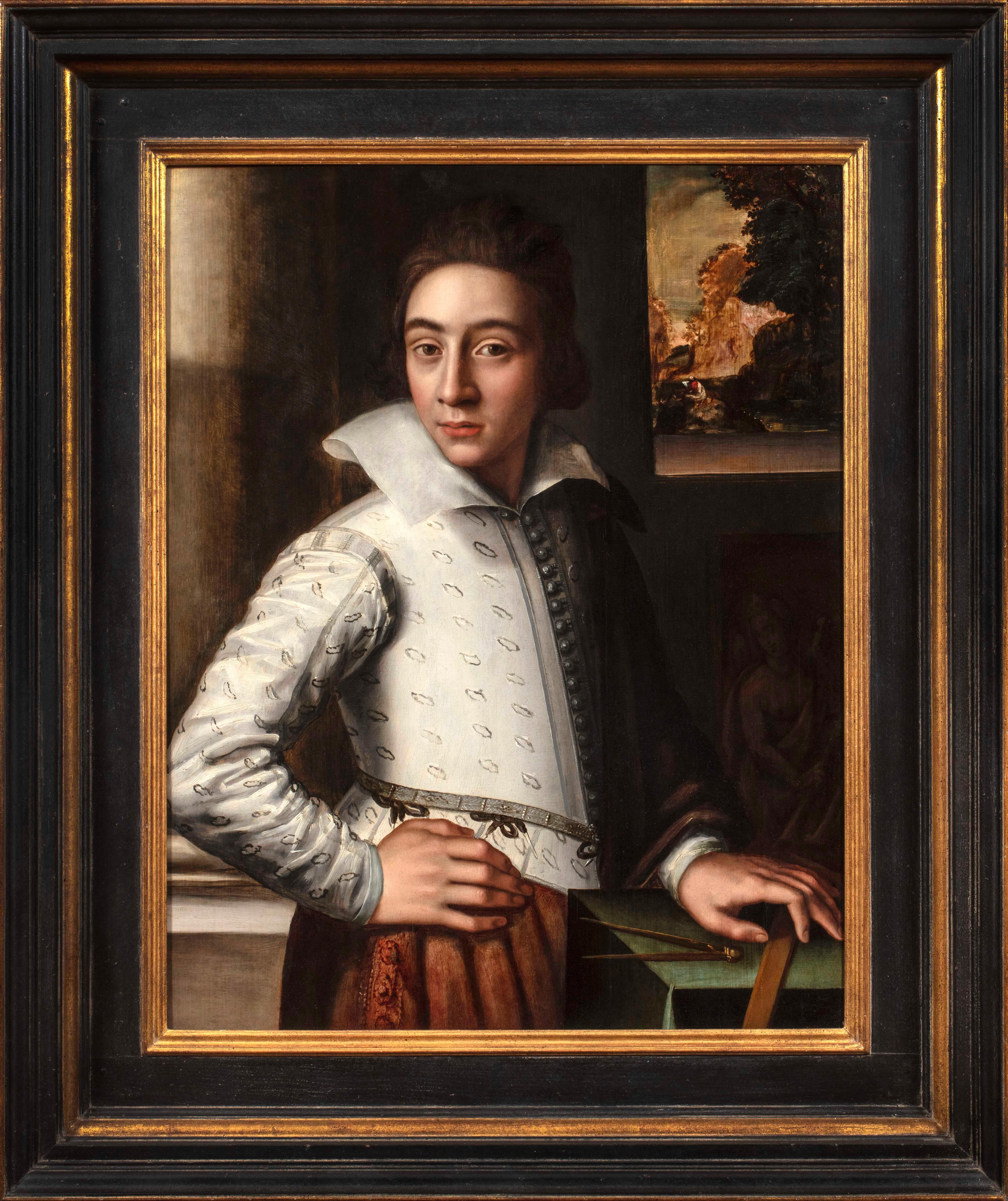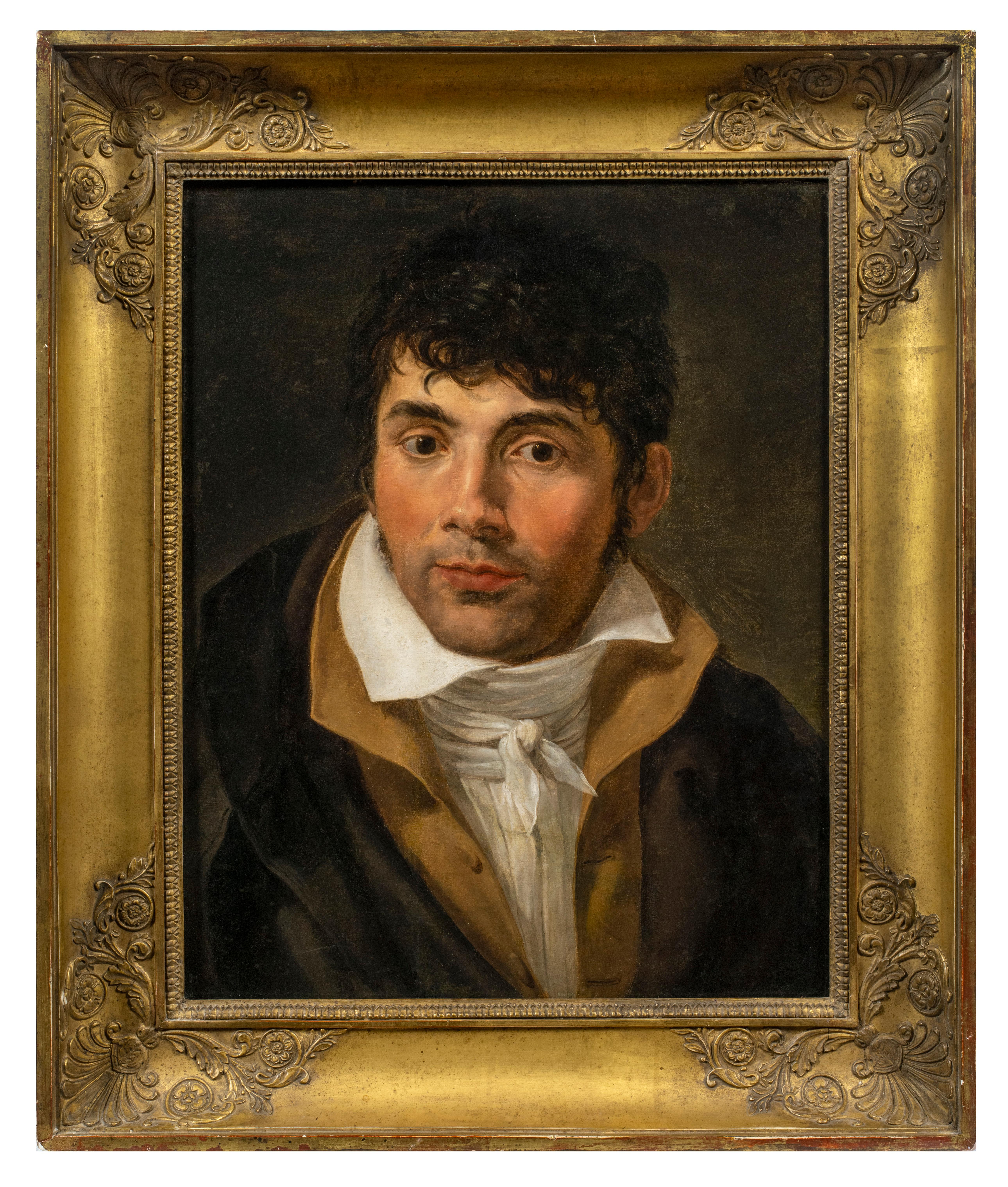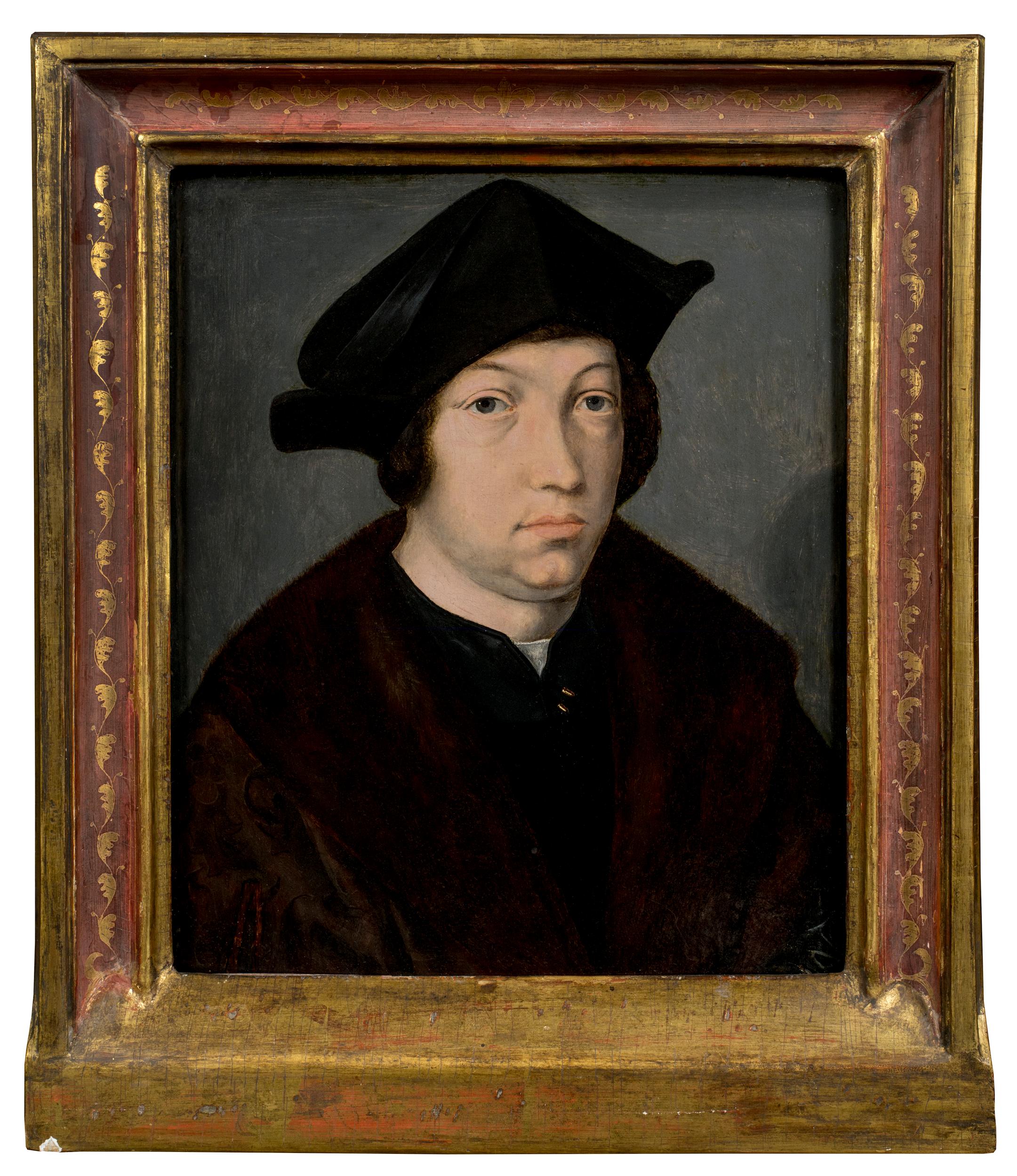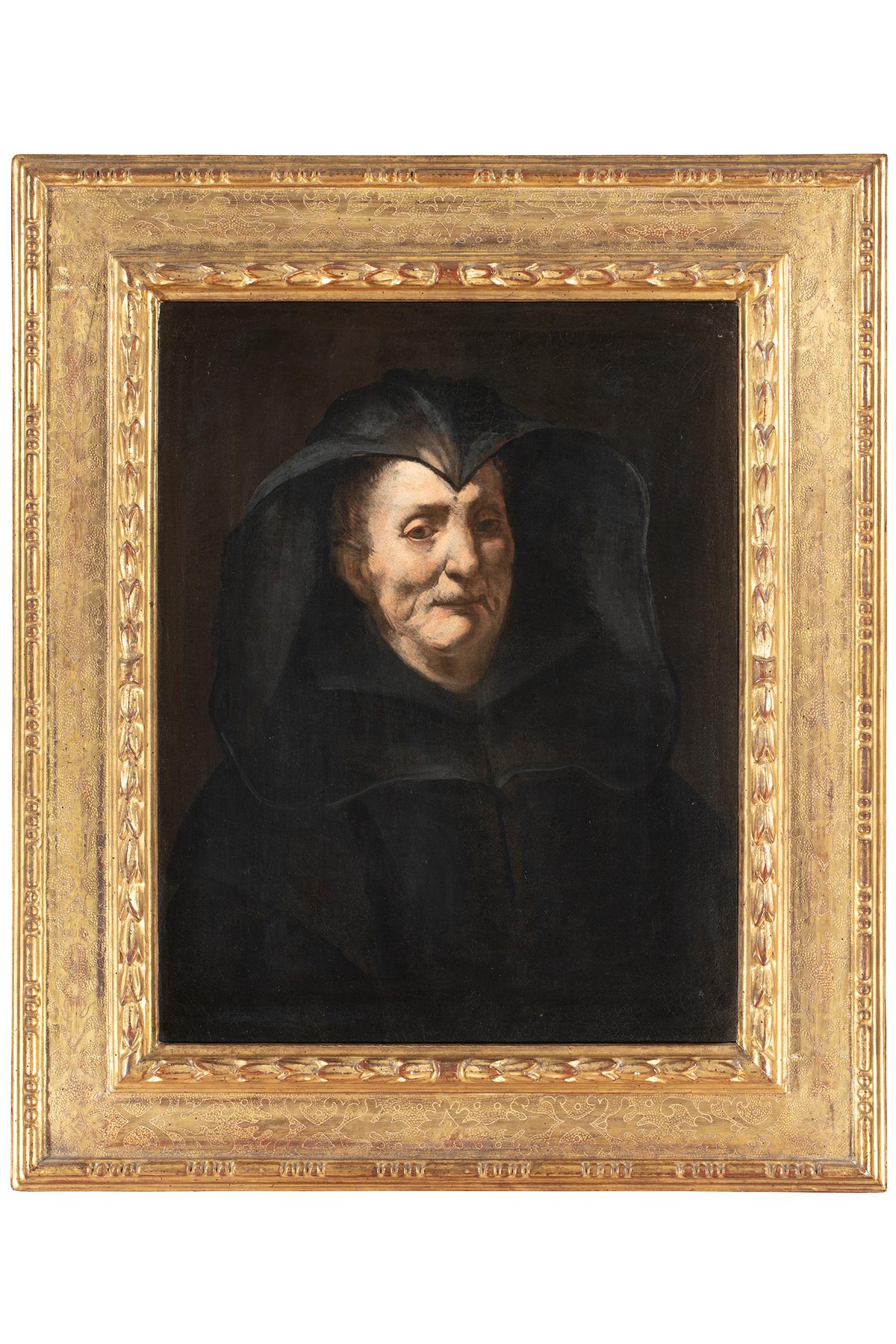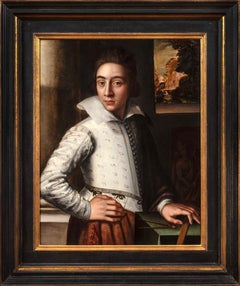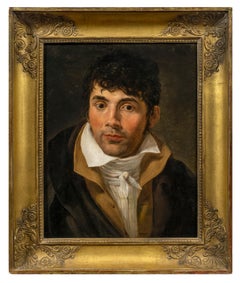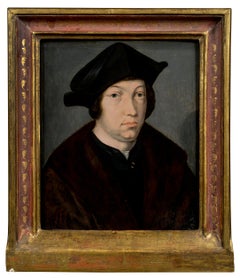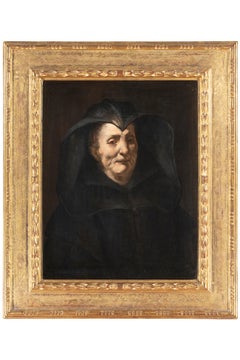Items Similar to Quellinus Allegory Vanity Paint Oil on canvas old master 17th Century Flemish
Want more images or videos?
Request additional images or videos from the seller
1 of 14
Quellinus Allegory Vanity Paint Oil on canvas old master 17th Century Flemish1630-1670
1630-1670
About the Item
Erasmus Quellinus II (Antwerp 1607 - 1672)
Vanitas (as an Allegory of the Vanity of Life or of Youth)
Oil painting on canvas - cm. 121 x 84, in the frame cm. 135 x 98
The work is accompanied by an in-depth study written by prof Emilio Negro, from which we present some extracts.
The theme of the painting that we propose is a singular and rare "Vanitas", a subject of strong moral value which, in the pictorial field, refers to a composition with symbolic elements alluding to the theme of the transience of life, and therefore intent on soliciting the viewer to meditation on the transience of human destiny and on the fragility of worldly pleasures.
These subjects, which had particular success in the Flemish context, are works of great charm, interesting to study and often difficult to decipher; protagonist of our canvas we see a capricious little love, sitting on a sarcophagus, a sort of pictorial anthropomorphic Carpe Diem (seize the fleeting moment), who invites you to meditate on the transience of life and to enjoy the moments of happiness it grants; this regardless of the alternating fortunes of fate, symbolized by the putto's foot trampling the gold coins, the precious fabric, the scepter, the ermine stole, the skull, the hunting horn and the books.
Next to him is a still life of multicolored flowers, collected in a crystal vase, whose presence takes on a clear allegorical meaning, since they constitute the metaphor of the transience of youthful beauty which, like fresh flowers, is destined to wither. .
Particularly noteworthy is the stone sepulcher on which the sweetheart sits, on which stands the acronym "DMS", to be dissolved in the Latin phrase "Diis Manibus Sacrum", that is to the sacred gods of hands, corresponding to the invocation carved on the tombstones. of the last paganism, addressed to the spirits of the deified ancestors.
Another very interesting detail is the white sheet that emerges from the pages of the voluminous closed psalter, in which the Latin phrase is traced in beautiful seventeenth-century calligraphy: "Defecerunt sicut fumus dies / mei Psal J.97" to translate: "my days almost smoke they have vanished "(Psalter, Psalm 1. 97), equivalent to another exhortation to reflect on the short duration of existence.
With regard to the pictorial origin of the composition in question, it should be noted first of all that it is an interesting replica, with some modifications, of a four-handed work by Erasmus Quellinus the Younger (the figure of the putto) and Daniel Seghers (the still life).
Of the same composition is also known a version entitled 'Allegory of the passage of Youth', passed by Sotheby's in Amsterdam as Cornelis Schut and Daniël Seghers (12.12.1991, Old master Paintings and Drawings, lot 218, Price € 16,630, then sold to London as Thomas Willeboirts Bosschaert (Sotheby's 16.12.1999, lot 59, hammer price: € 126,592 / £ 80,000).
And again the Vanity attributed to Thomas Willeboirts Bosschaert and passed to Vienna by Dorotheum (17/10/2007, E estimated: € 18,000-24,000, link:
As for the painting in question, we can compare its realization to a capable Flemish artist of the Grand Siècle, attentive to the rendering of details and faithful to the teachings learned thanks to the study of the compositions created by the best seventeenth-century masters: in our canvas, in fact, clear post accents stand out. -Caravaggesque and post-Rubensian, typical of the pupils of Wallerant Vaillant; peculiar stylistic features that are captured in the effective contrasts of light and in the fluid pictorial mixture and balanced colors.
These reasons make it possible to connect this Vanitas to the modus operandi of the aforementioned Erasmus Quellinus the Younger (Antwerp, 1607-1678), one of Rubens' closest collaborators in the 1830s, here assisted by the intervention of a valid collaborator trained in inside his active workshop.
Descending from a renowned family of artists (since his father was the painter Erasmus Quellinus the Elder) Erasamus Quellinus II worked mainly in Flanders where his activity is testified by the numerous compositions similar to ours, attributed to him and kept in the most important public and private collections. In addition, he was the head of an established atelier in which numerous students were trained including his children and grandchildren. It is true that in the canvas in question, credibly destined to adorn the walls of a noble residence of a collector, writer or humanist, an accurate painting emerges, especially in the insistent search for details, in warm colors, which are specific qualities of the best works performed. from Erasmus.
- Attributed to:Erasmus Quellinus II (Antwerp 1607 - 1672) (1607 - 1672, Flemish, Belgian)
- Creation Year:1630-1670
- Dimensions:Height: 53.15 in (135 cm)Width: 38.59 in (98 cm)
- Medium:
- Movement & Style:
- Period:
- Condition:
- Gallery Location:Riva del Garda, IT
- Reference Number:1stDibs: LU98819440732
About the Seller
4.9
Platinum Seller
Premium sellers with a 4.7+ rating and 24-hour response times
Established in 2017
1stDibs seller since 2018
239 sales on 1stDibs
Typical response time: <1 hour
- ShippingRetrieving quote...Shipping from: Riva del Garda, Italy
- Return Policy
Authenticity Guarantee
In the unlikely event there’s an issue with an item’s authenticity, contact us within 1 year for a full refund. DetailsMoney-Back Guarantee
If your item is not as described, is damaged in transit, or does not arrive, contact us within 7 days for a full refund. Details24-Hour Cancellation
You have a 24-hour grace period in which to reconsider your purchase, with no questions asked.Vetted Professional Sellers
Our world-class sellers must adhere to strict standards for service and quality, maintaining the integrity of our listings.Price-Match Guarantee
If you find that a seller listed the same item for a lower price elsewhere, we’ll match it.Trusted Global Delivery
Our best-in-class carrier network provides specialized shipping options worldwide, including custom delivery.More From This Seller
View AllCupid Portrait Parmigianino Paint 17/18th Century Oil on canvas Old master Italy
Located in Riva del Garda, IT
Follower of FRANCESCO MAZZOLA, known as IL PARMIGIANINO (Parma, 1503 - Casalmaggiore, 1540)
Cupid Carving His Bow
(as the triumph of love and desire over reason and knowledge)
Oil o...
Category
18th Century Old Masters Paintings
Materials
Oil
$14,284 Sale Price
20% Off
Susanna Old Men Religious Roma nschool 17th Century Paint Oiul on canvas Italy
Located in Riva del Garda, IT
Painter active in Rome in the early 17th century
Susanna and the Old Men
Oil on canvas
76 x 62 cm.
with frame 92 x 78 cm.
This valuable painting illustrates the piquant episode, ta...
Category
17th Century Old Masters Paintings
Materials
Oil
$9,403 Sale Price
20% Off
St Jerome Religious Portrait Moretto 16th Century Paint Oil on canvas Old master
Located in Riva del Garda, IT
Sixteenth-century Lombard school
Workshop of Alessandro Bonvicino, known as Moretto (Brescia, c. 1498 – 1554)
St Jerome Oil on canvas 81 x 68 cm. - In a fine antique frame 98 x...
Category
16th Century Old Masters Paintings
Materials
Oil
$10,117 Sale Price
20% Off
Pietà Religious Jesus Lama 16/17th Century Paint Oil on table Old master Italy
Located in Riva del Garda, IT
Giovan Bernardo Lama (Naples, 1536-1600 ca.)
The Pietà oil on panel 51 x 41 cm. Antique frame (defects and faults) 66 x 56 cm.
Observing the exquisite quality and the elegance ...
Category
16th Century Old Masters Paintings
Materials
Oil
$5,832 Sale Price
20% Off
Holy Family St John Scarsella Paint 17th Century Oil on table Old master Italy
Located in Riva del Garda, IT
Ippolito Scarsella, known as Lo Scarsellino (Ferrara, c. 1550 - 1620) workshop
Holy Family with the Infant St John
oil on arched panel 46 x 29 cm.
in a small temple frame 75 x 55 cm
This interesting work shows us one of the most sought-after iconographic subjects in the Christian tradition, presented here according to an ancient and proven scheme. We see the Virgin, majestic, in the centre of the scene while holding a chubby child, who is offering a small bird to the young St John (tradition has it that it is a goldfinch, one of the symbols of the passion of Christ) to be caressed.
Completing the Holy Family, we can see Saint Joseph in the shadows, apart from the loving everyday scene depicted in the foreground, calmly leaning on his walking stick.
Regarding the stylistic characteristics of this small panel, it is easy to recognise the influence of 16th and 17th century Emilian painting, which leads us to confirm its traditional attribution to Ippolito Scarsella (circa 1550 - 1620) from Ferrara, undoubtedly one of the most important artists of this pictorial context. It could very well be a trial sketch...
Category
17th Century Old Masters Paintings
Materials
Oil
$5,832 Sale Price
20% Off
Portrait Duchess Woman 17th Century Paint Van Gelder Oil on canvas Old master
Located in Riva del Garda, IT
Jan van Gelder, Italianised as Giovanni Vangheldri (Antwerp 1621 – Modena 1685)
Portrait of the Duchess Vittoria Farnese d'Este (Parma, 1618 – Modena, 1649) wife of Francesco I d'E...
Category
17th Century Old Masters Paintings
Materials
Oil
$8,927 Sale Price
20% Off
Free Shipping
You May Also Like
Portrait of an Artist (possibly a Self-Portrait)
Located in New York, NY
Provenance:
Bradley Collection.
Private Collection, Upperville, Virginia.
Literature:
Katlijne van der Stighelen and Hans Vlieghe, Rubens: Portraits of Unidentified and Newly Identified Sitters painted in Antwerp, Corpus Rubenianum Ludwig Burchard, vol. 19, pt. 3, London and Turnhout, 2021, under cat. no. 189, p. 161, and fig. 75.
This painting had previously been considered to be by an anonymous Tuscan painter of the sixteenth century in the orbit of Agnolo Bronzino. While the painting does in fact demonstrate a striking formal and compositional similarity to Bronzino’s portraits—compare the nearly identical pose of Bronzino’s Portrait of a Young Man in the Metropolitan Museum of Art (Fig. 1)—its style is completely foreign to Italian works of the period. That it is painted on an oak panel is further indication of its non-Italian origin.
This portrait can in fact be confidently attributed to the Antwerp artist Huybrecht Beuckelaer. Huybrecht, the brother of Joachim Beuckelaer, has only recently been identified as the author of a distinct body of work formerly grouped under the name of the “Monogrammist HB.” In recent studies by Kreidl, Wolters, and Bruyn his remarkable career has been delineated: from its beginnings with Joachim in the workshop of Pieter Aertsen; to his evident travels to Italy where, it has been suggested, he came into contact with Bronzino’s paintings; to his return to Antwerp, where he seems to have assisted Anthonis Mor in painting costume in portraits; to his independent work in Antwerp (where he entered the Guild of Saint Luke in 1579); and, later to his career in England where, known as “Master Hubberd,” he was patronized by the Earl of Leicester. Our painting was recently published by Dr. Katlijne van der Stighelen and Dr. Hans Vlieghe in a volume of the Corpus Rubenianum, in which they write that the painting “has a very Italian air about it and fits convincingly within [Beuckelaer’s] oeuvre.” Stighelen and Vlieghe compare the painting with Peter Paul Ruben’s early Portrait of a Man, Possibly an Architect or Geographer in the Metropolitan Museum of Art, in which the sitter holds a compass and wears a similarly styled doublet (Fig. 2).
Huybrecht both outlived and travelled further afield than his brother Joachim, who made his career primarily in Antwerp. Whereas Joachim was the main artistic inheritor of their uncle and teacher, Pieter Aertson, working in similar style and format as a specialist in large-scale genre and still-life paintings, Huybrecht clearly specialized as a painter of portraits and was greatly influenced by the foreign artists and works he encountered on his travels. His peripatetic life and his distinctly individual hand undoubtedly contributed to the fact his career and artistic output have only recently been rediscovered and reconstructed. His periods abroad seem to have overlapped with the mature phase of his brother Joachim’s career, who enrolled in the Antwerp Guild of Saint Luke much earlier than his brother, establishing himself as an independent painter in 1560. Joachim’s activity was confined to the following decade and half, and his latest work dates from the last year of his life, 1574. Our portrait was likely produced in the late 1560s, a dating supported by the dendrochronological investigation performed by Dr. Peter Klein, which established that it is painted on an oak panel with an earliest felling date of 1558 and with a fabrication date of ca. 1566.
This painting presents a portrait of an artist, almost certainly Huybrecht’s self-portrait. The young sitter is confidently posed in a striking patterned white doublet with a wide collar and an abundance of buttons. He stands with his right arm akimbo, his exaggerated hands both a trademark of Huybrecht and his brother Joachim’s art, as well as a possible reference to the “hand of the artist.” The figure peers out of the painting, interacting intimately and directly with the viewer, as we witness him posed in an interior, the tools and results of his craft visible nearby. He holds a square or ruler in his left hand, while a drawing compass...
Category
16th Century Old Masters Paintings
Materials
Oil, Panel
Portrait of a Gentleman
Located in New York, NY
Circle of Jacques-Louis David
(French, 18th Century)
Provenance:
Private Collection, Buenos Aires
Exhibited:
“Art of Collecting,” Flint Institute of Art, Flint, Michigan, 23 November 2018 – 6 January 2019.
This vibrant portrait of young man was traditionally considered a work by Jacques-Louis David, whose style it recalls, but to whom it cannot be convincingly attributed. Rather, it would appear to be by a painter in his immediate following—an artist likely working in France in the first decade of the nineteenth century. Several names have been proposed as the portrait’s author: François Gérard, Louis Hersent, Anne-Louis Girodet (Fig. 1), Theodore Gericault, and Jean-Baptiste Wicar, among others. Some have thought the artist Italian, and have proposed Andrea Appiani, Gaspare Landi...
Category
18th Century Old Masters Paintings
Materials
Canvas, Oil
$45,000
Portrait of a Man
Located in New York, NY
Provenance:
with Leo Blumenreich and Julius Böhler, Munich, 1924
Dr. Frederic Goldstein Oppenheimer (1881-1963), San Antonio, Texas; by whom given to:
Abraham M. Adler, New York, until 1985; thence by descent to the present owners
While old inscriptions on the verso of this panel propose its author to be Hans Holbein and the sitter Sir John More—a lawyer, judge, and the father of Sir Thomas More—this fine portrait has long been recognized to be by a Flemish hand. Max Friedländer gave the painting to Bernard van Orley (1487/1491 – 1541) in 1924, but did not include it in the volume dedicated to the artist in his Early Netherlandish Paintings...
Category
16th Century Old Masters Portrait Paintings
Materials
Oil, Panel
$52,500
17th Century by Giuseppe Assereto Portrait of an Elderly Woman Oil on Canvas
By Giuseppe Assereto
Located in Milano, Lombardia
Giuseppe Assereto (Genova - 1626 ca – Genova 1656/57)
Title: Portrait of an elderly woman, possible portrait of Maddalena Massone, wife of Gioacchino Assereto
Medium: Oil on canvas
D...
Category
Early 17th Century Old Masters Portrait Paintings
Materials
Canvas, Oil
17th Century by Juan Alfonso Abril Head of St Paul Painting Oil on Canvas
Located in Milano, Lombardia
Juan Alfonso Abril (active in the 17th century in Valladolid, Spain)
Title: Head of Saint Paul
Medium: Oil on canvas
Dimensions: without frame 48.5 x 62 ...
Category
Early 17th Century Old Masters Figurative Paintings
Materials
Canvas, Oil
Portrait of Lady Bagot - Niece to the Duke of Wellington
By Sir John Hoppner
Located in Miami, FL
The sitter is Mary Charlotte Anne Wellesly-Pole, eldest daughter of William, 4th Earl of Mornington and niece to the Duke of Wellington. This is one of Hoppner's best works. The sitt...
Category
1780s Old Masters Portrait Paintings
Materials
Oil
$284,000 Sale Price
20% Off
Recently Viewed
View AllMore Ways To Browse
Same Old
17th Century Old Master Oil Painting
Old Master Flower Painting
Old Master Flemish
Flemish Oil Painting
Antique Flemish Frame
Old Masters Paintings In Gold Frames
Old Master Painting Flemish
Old Master Paintings Of Children
17th Century Flemish Painting
Old Masters Attributed
Old Faithful
Old Coins
Antique Oil Stone
Flemish Flower Painting
Anthropomorphic Paintings
J Daniel
Replica Paintings
